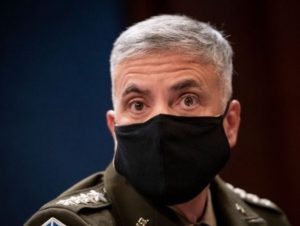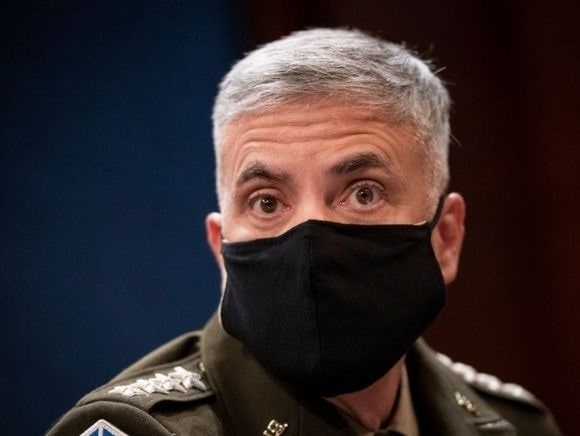President Joe Biden had a bad national security year in 2021, mostly from self-inflicted injuries and unforced errors. Former Israeli foreign minister Abba Eban’s quip about how the late Palestinian leader Yasser Arafat “never misses an opportunity to miss an opportunity” rings true with the current White House team. Whether strategic negotiations with Russia and China or the precipitous U.S. escape from Afghanistan, the Biden White House repeatedly failed to grab the chance for success.
 The president’s national security priorities were clear from the opening bell, and they did not include keeping Americans safe from real global threats. Emblematic of the administration’s worldview is the Interim National Security Strategy Guidance (INSSG) released in March 2021. As Liberty Nation’s analysis showed, the U.S. national security team cared more about the weather than the threats posed by China, nuclear weapons, Iran, Russia, and North Korea.
The president’s national security priorities were clear from the opening bell, and they did not include keeping Americans safe from real global threats. Emblematic of the administration’s worldview is the Interim National Security Strategy Guidance (INSSG) released in March 2021. As Liberty Nation’s analysis showed, the U.S. national security team cared more about the weather than the threats posed by China, nuclear weapons, Iran, Russia, and North Korea.
As LN explained, the entire 17-page guidance mentions the dangers of “climate” 27 times. China, as Congress confirmed, is the most pressing threat to the U.S., but the INSSG referenced the Peoples’ Republic of China (PRC) as a menace only 15 times. Nuclear threats were only brought up seven times. Russia received five mentions, Iran four, and America’s dangerous adversary, North Korea’s “dear leader” Kim Jong Un, received two paltry references. The INSSG does not reflect the legitimate priority of threats faced by the U.S., but it drives Biden’s national security team’s decision-making.
On January 21, 2021, one day after being sworn into office, Biden ditched more than a year of work his predecessor accomplished, pushing the Russians for a more substantial Strategic Arms Reduction Treaty (New START) set to expire that February. Former President Trump had pressed Russian President Putin to address long- and short-range ballistic missiles and tactical nuclear weapons. Trump also wanted a reluctant China included in the treaty talks. Putin requested a year extension to the existing treaty, kicking the negotiating can down the road.
Enter the Biden administration. Without getting any concessions from the Kremlin, the White House offered an extension of five years. According to AP, Marshall Billingslea, former President Donald Trump’s lead negotiator, tweeted: “Hope this is not true. If so, shows stunning lack of negotiating skill. Took just 24 hours for Biden team to squander most significant leverage we have over Russia.” Of course, it was true.
Taking on China, the newly installed U.S. negotiating team of Secretary of State Antony Blinken and National Security Advisor Jake Sullivan met for the first time with their Chinese Communist Party (CCP) counterparts, Foreign Minister Wang Yi and Yang Jiechi, a member of the CCP Politburo. Each of the U.S. negotiators entered the talks with roughly 50 days of experience in their jobs. By contrast, their PRC opponents had both been in their positions for eight years. So, discussions started with an experience mismatch. As Liberty Nation explained, “The first talks between President Biden’s national security team and the Chinese Communists began with a heated exchange that did not bode well for the remainder of the discussions.” After the bilateral meeting was concluded, the best that anyone could say was there were “no major diplomatic breakthroughs.” Truth be told, the Beijing representatives turned the meeting into pure theater, and the CCP actors got all the best lines.

Director of the National Security Agency Gen. Paul Nakasone (Photo by Drew Angerer/Getty Images)
The Biden national security policy was not advanced in the first encounters with America’s two major global adversaries. But the failed engagements with Russia on a New START agreement and with China to iron out differences paled in comparison with the debacle that was the withdrawal of the U.S. from Afghanistan. Arguably the most disastrous of the 2021 Biden White House’s foreign and defense policy gambits was the ignominious retreat of U.S. military and civilians from the Afghan capital’s international airport. Many believed the time had come for an orderly withdrawal from Afghanistan, but President Biden made a decision that resulted in a disorderly catastrophe. He set a specific date, August 31, for the departure of all Americans.
He could have said that U.S. forces will be out of Afghanistan with all dispatch and complete when the last American has departed. But he didn’t. The false sense of urgency generated by the date certainly precipitated a host of bad decisions. The order to abandon Bagram Air Base, leaving only the Kabul airport for exiting troops and civilians, was short-sighted. That and the decision not to provide intense close air support to the Afghan security forces to stem the advance of the Taliban are but two examples of poor administration decision-making.
The current U.S. chief executive and his team could have seized the opportunity for success numerous times but did not. The clumsy leadership applied to the Afghanistan withdrawal left America looking inept on the world stage. The troubling question is, in the time left to the Biden administration, can the national security team recover America’s lost prestige and credibility?
The views expressed are those of the author and not of any other affiliation.
~ Read more from Dave Patterson.




